The Australian Small Business and Family Enterprise Ombudsman, Bruce Billson, has outlined 14 steps to better support and energise Australia’s 2.5 million small businesses.
Small business generate 33% of our nation’s GDP and provide jobs for 5.36 million people – 42% of our private workforce. This contribution is truly worthy of recognition and celebration. However, in 2006, small business contributed 40% of GDP and employed 53% of those with a private sector job. This is a worrying trajectory.
We need to create a more supportive ecosystem to inspire Australians to turn an idea into investment, build a business, adopt the risk and responsibility of creating a new enterprise and employ that extra person. We need to give enterprising people the best chance to be successful.
Read the Ombudsman’s introduction, data snapshots and 14 steps to energise enterprise below or download the full report.
Almost 98% of businesses in Australia are small businesses – some 2.5 million which generate nearly $600 billion of economic activity accounting for 33% of our nation’s GDP.
Small businesses provide jobs for 5.36 million people – 42% of the private workforce.
This contribution is truly worthy of recognition and celebration. Small business is a big deal.
But just back in 2006, small business contributed 40% of GDP and employed 53% of those with a private sector job.
If you are like me and believe small and family business is the engine room of our economy and a vital driver of innovation, wealth and opportunity creation, and key to lifting our nation’s productivity, this is a worrying trajectory.
We are sleepwalking into a ‘big corporate’ economy.
We need to do more to energise enterprise and create and nurture the spark that will inspire someone to turn an idea into investment, to build a business, to take on the risk and big responsibility of creating an opportunity-generating new enterprise, and to employ that extra person.
Small and family businesses need to be front of mind for our policy makers and regulators.
We need to constantly renew and re-nourish our commitment to providing the best possible environment for small and family business success.
New figures from the Tax Office reveal that 46% of small businesses did not make a profit in the most recent year of accounts available.
And some three-quarters of self-employed business owners, for whom their business is their full-time livelihood endeavour, are earning less than the average total weekly, full-time wage.
Sluggish economic growth combined with cost of doing business pressures, persistently poor productivity, tight labour markets, supply chain challenges, the flow through effects of high inflation, plus interest rate rises, are all taking their toll on small and family businesses.
Our small business owners are also getting older with the average age now 50, up from 45 where it was in 2006. In the 1980s there were twice as many small business owners aged between 30 and 49 as there were aged over 50.
Today, only 8% of small business owners are under the age of 30, half what it was in the 1970s.
Why is the next generation increasingly not seeing self-employment or their own enterprise as a pathway for the future? At a time when young people, particularly, look for purpose as well as profit in their lives, to choose their own path and shape their own story, isn’t self-employment or running your own businesses a seemingly natural fit?
Surely, we can and must do more to make the risk and reward balance more attractive. We need to create a more supportive ecosystem to give enterprising people the best chance to be successful.
No one starts a small business because they are excited about the paperwork involved; yet the cumulative compliance burden and fear and consequences of doing something wrong is having a chilling effect on entrepreneurship.
A small business isn’t a shrink-wrap version of a big corporation. There’s no regulatory team, dedicated HR department, compliance specialists or sophisticated compliance systems.
Typically, it’s the owner – often at 10 o’clock at night - grappling with this paperwork after they’ve been running their business all day, surrendering more time with family and time to reset and refresh. Let’s remember, a small business is actually a time-poor, resource-constrained person.
Every well-intentioned change by Parliament or regulators risks adding to the mountain of red tape that gets between the owner, the business they lead and the customers they need to attract and delight.
There’s been a flurry of new workplace laws and compliance obligations, and cascading reporting requirements relating to modern slavery and climate-related financial disclosures, adding to what we call ‘white tape’ where big business is insisting on more and more information from small business suppliers.
Small and family businesses recognise their responsibilities but need a right-sized, actionable, fit-for-purpose, and efficient approach to compliance impositions with appropriate support and guidance.
A simple improvement that governments at all levels around the country can make immediately is to require every submission to Cabinet to include a small business impact statement. Preliminary and formal regulatory impact assessments and new policy proposals should start with and focus on small business implications, not consider this as an afterthought, if at all.
This would mean every time a decision is made, small business will be front of mind and bright on the radar screen.
We can and need to herald the importance of small and family business to the economy and our communities. By creating the Prime Minister’s Small Business Awards to celebrate excellence and achievement and inspire the next generation, we can powerfully send a clear message that small business people matter and are valued.
Small business owners feel acute pressure to ‘do it all’ and to keep up the appearance of being fine even when they are struggling with the big responsibility of business ownership and viability, their mental health and team wellbeing. The livelihoods of others – family, business partners, employees, and suppliers – depend on them. Their identities are interwoven into their business and the stakes are so much higher than just a job.
Many people have invested a lifetime and often their life savings - and put their family home on the line - to build up their business, which amplifies the emotional challenges.
We must ensure that small and family business, as the engine room of the economy, can fire on all cylinders – not have a cylinder that is failing. There is no shortage of ‘winds in the face’ for small businesses at these challenging times. We must continue to seek to abate these challenges where we can - this is important, but alone it is not enough. We need to work to put more ‘wind in the sails’, to advantage our small and family businesses.
The greatest renewable resource in our country is the perpetual optimism of small and family business people.
We need to match this positivity with a supportive environment and entrepreneurial eco-system that provides every opportunity for small and family business strength and success.
Put simply, we need to energise enterprise.
This document proposes 14 steps that will energise enterprise and help put the small and family business economy back on the right trajectory, to be able to fully realise its potential to contribute to livelihood opportunities, higher living standards and community vitality.
Chart 1: Private sector employment by business size
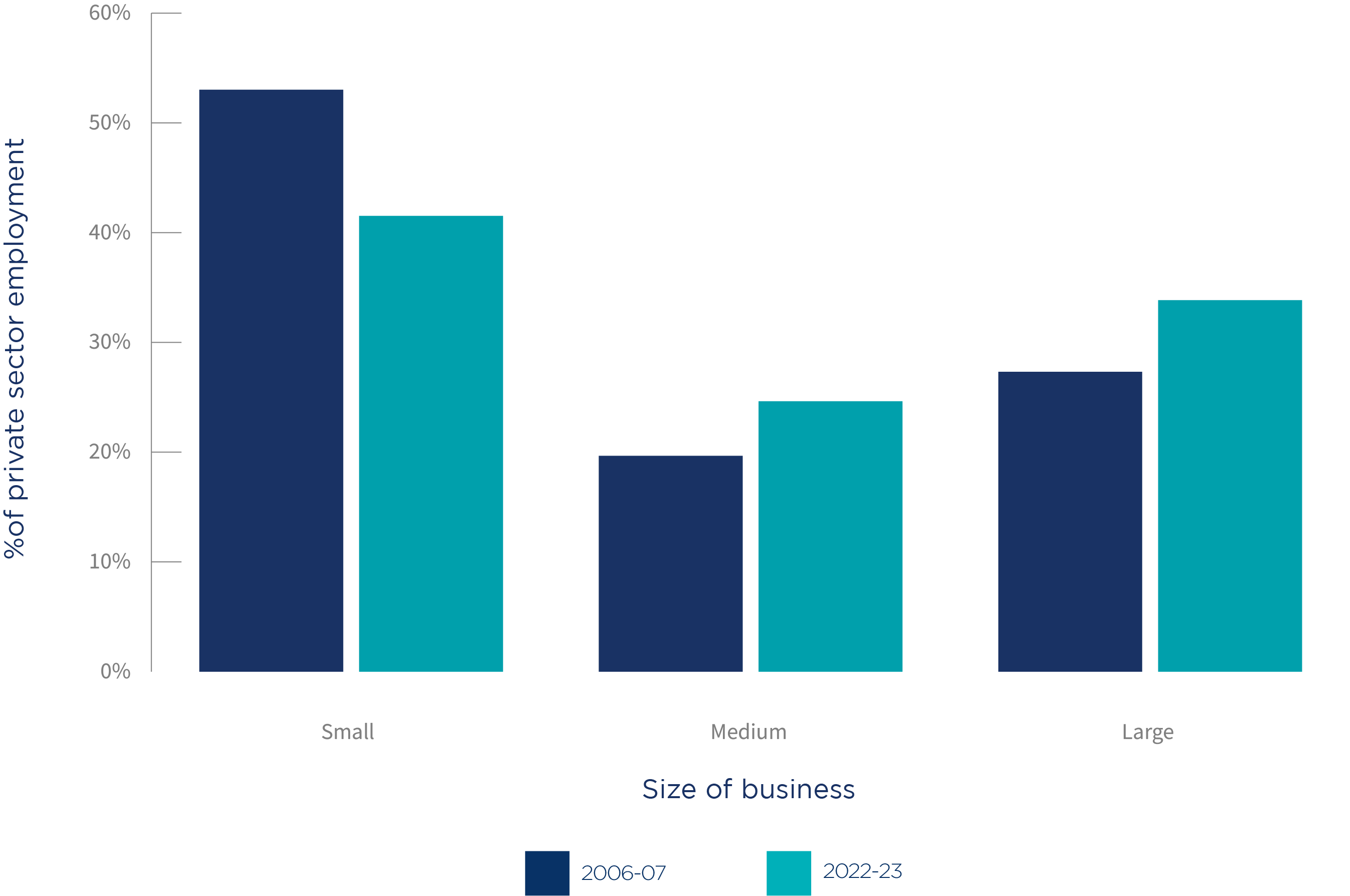
Source: Based on ABS, Australian Industry. Further information on the scope of this data is available in ABS, Australian Industry methodology.
Chart 2: Contribution to Gross Domestic Product, by business size
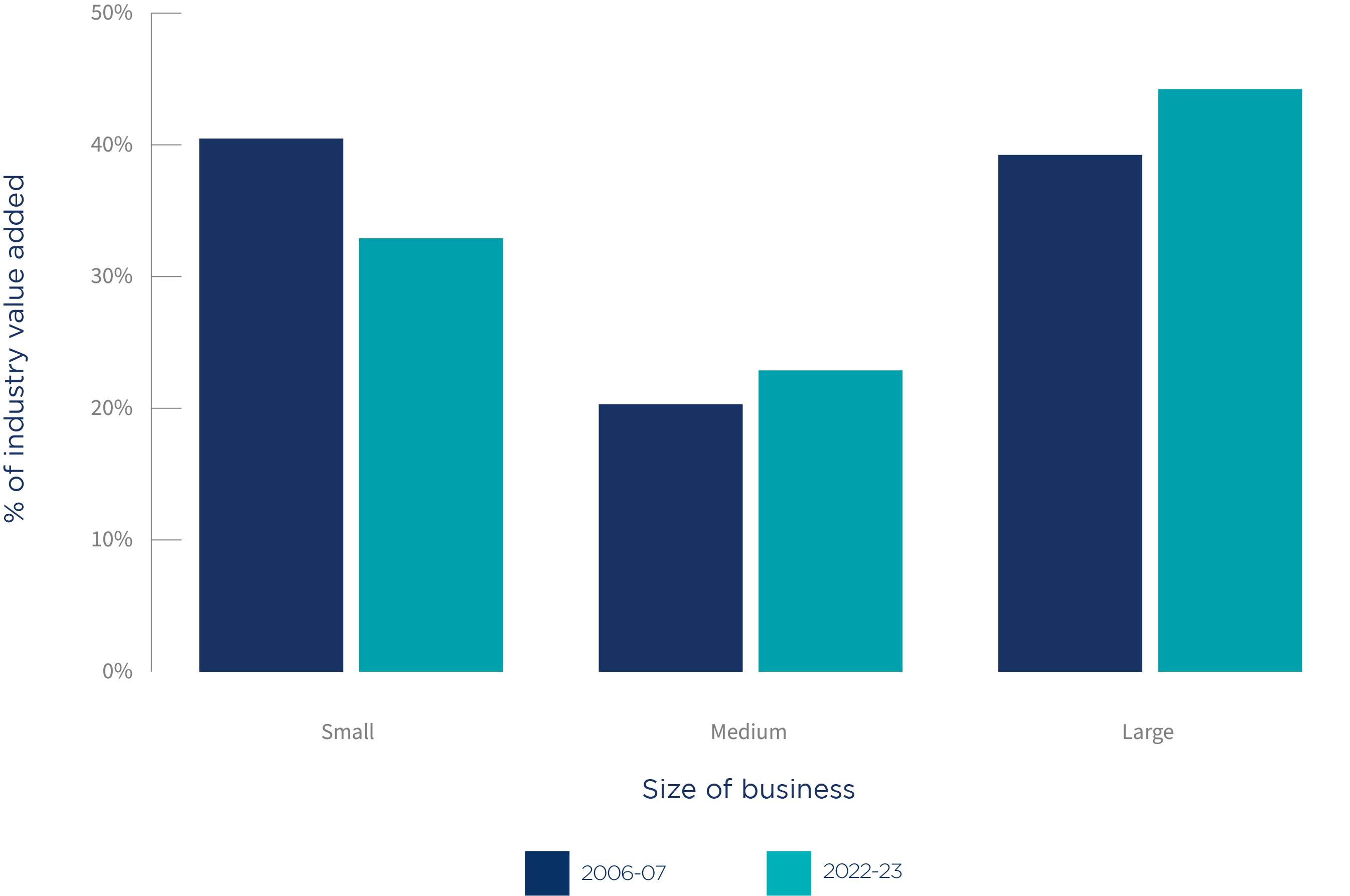
Source: Based on ABS, Australian Industry. Further information on the scope of this data is available in ABS, Australian Industry methodology.
Chart 3: Age of small business owners
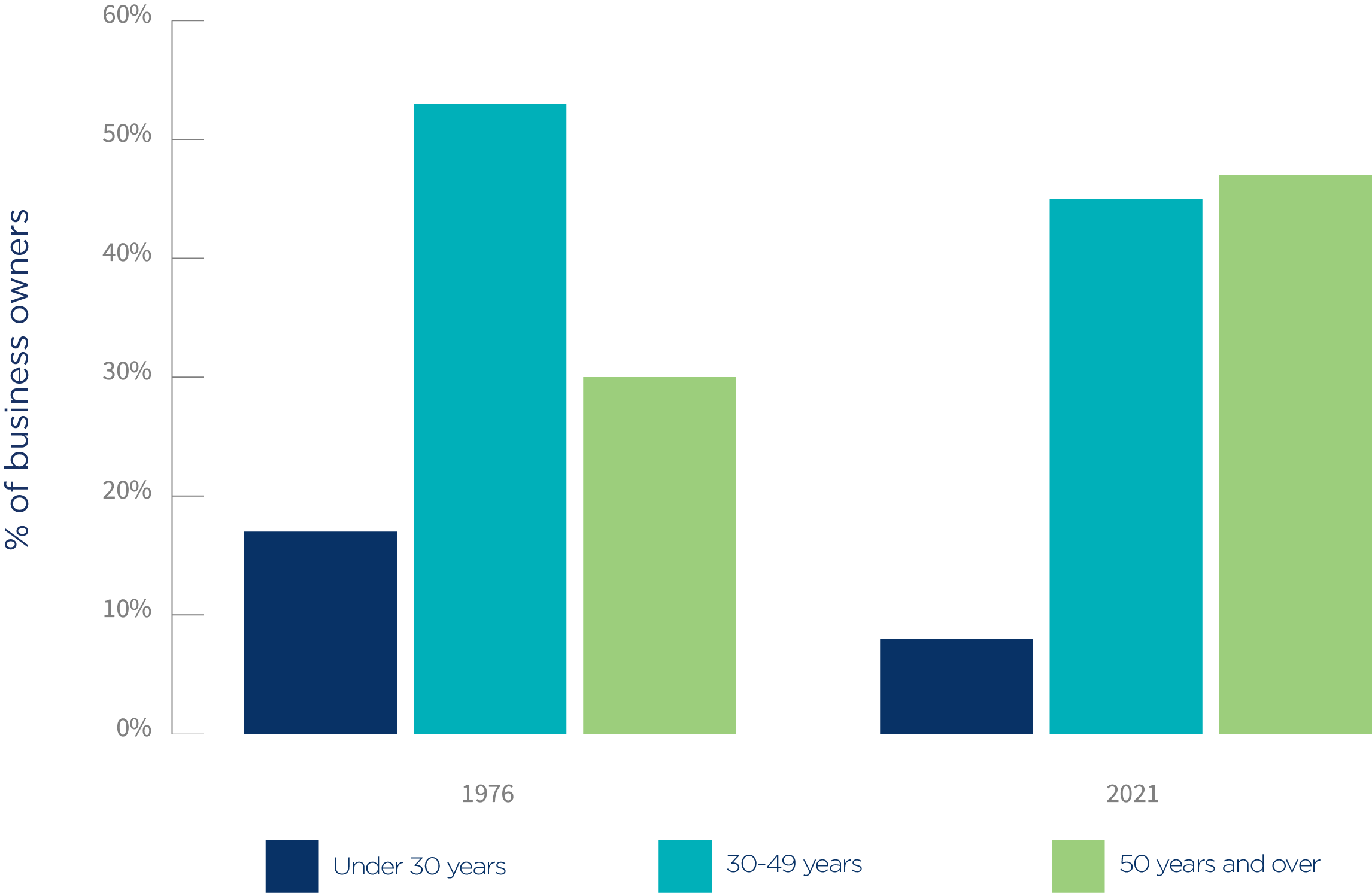
Total business owners: Based on Australian Bureau of Statistics, customised data, 2023.
Chart 4: Annual corporate insolvencies
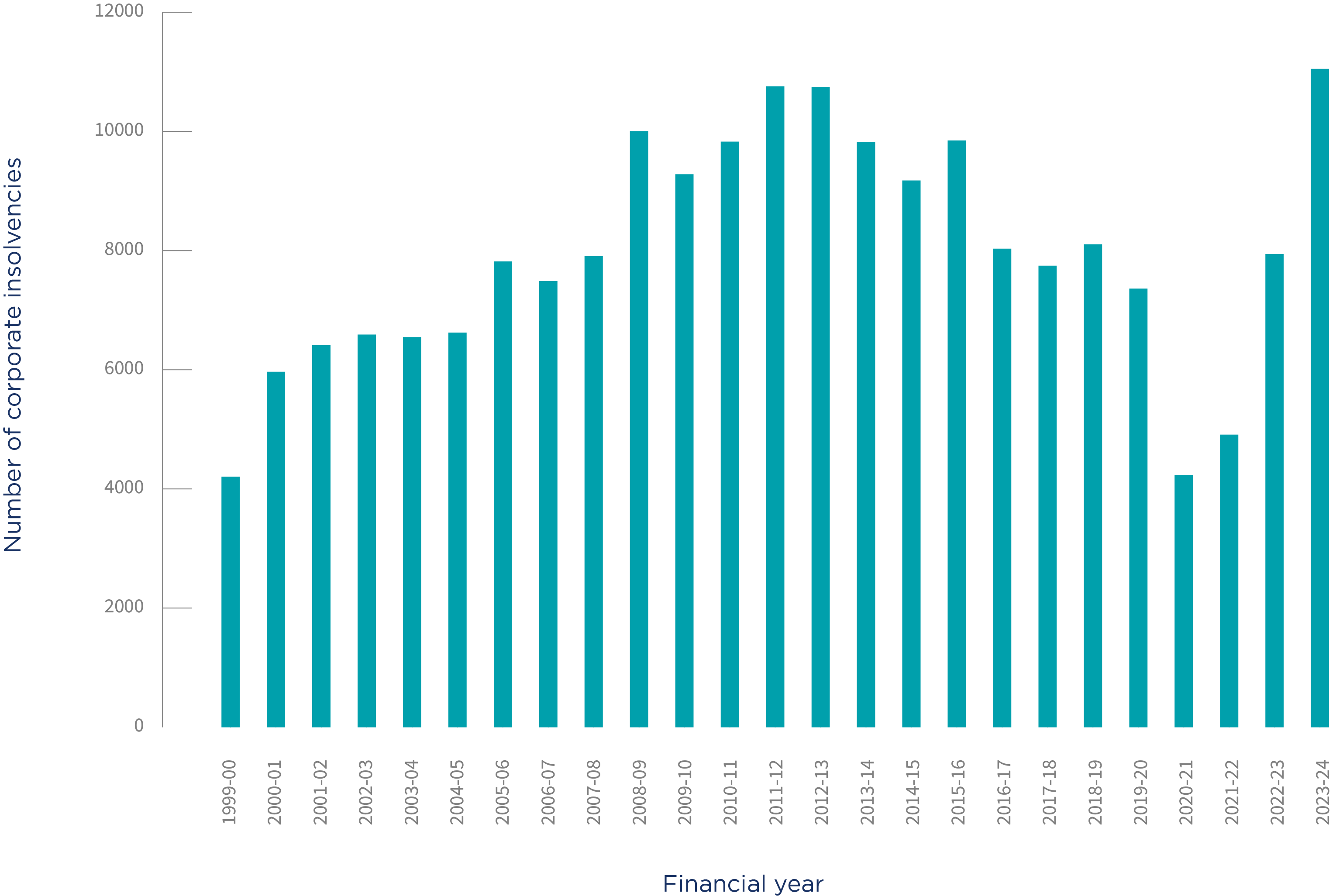
Source: ASIC, Australian Insolvency Statistics.
Chart 5: ASBFEO Pulse
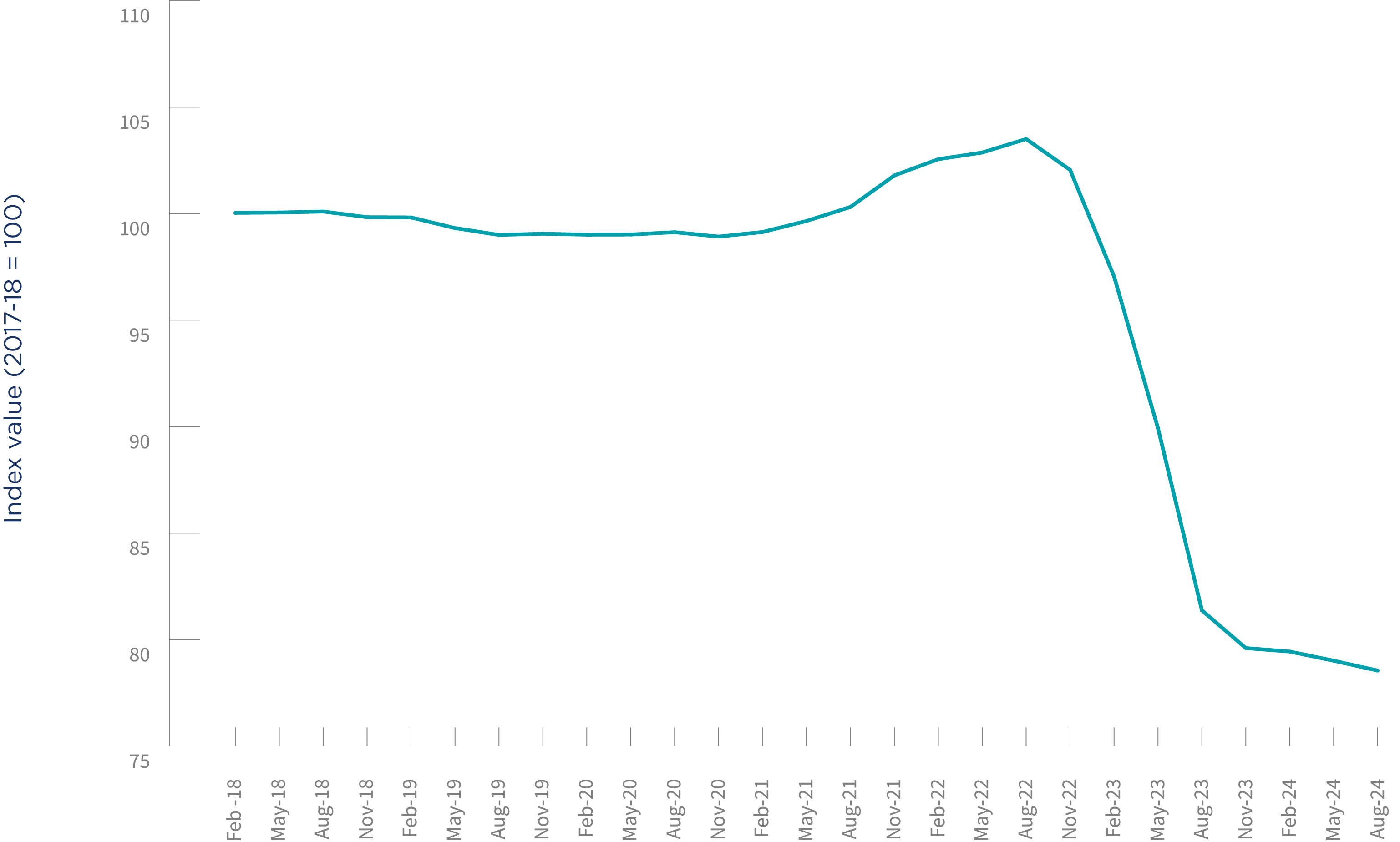
Source: ASBFEO, 2024.
Chart 6: Change in ASBFEO Pulse
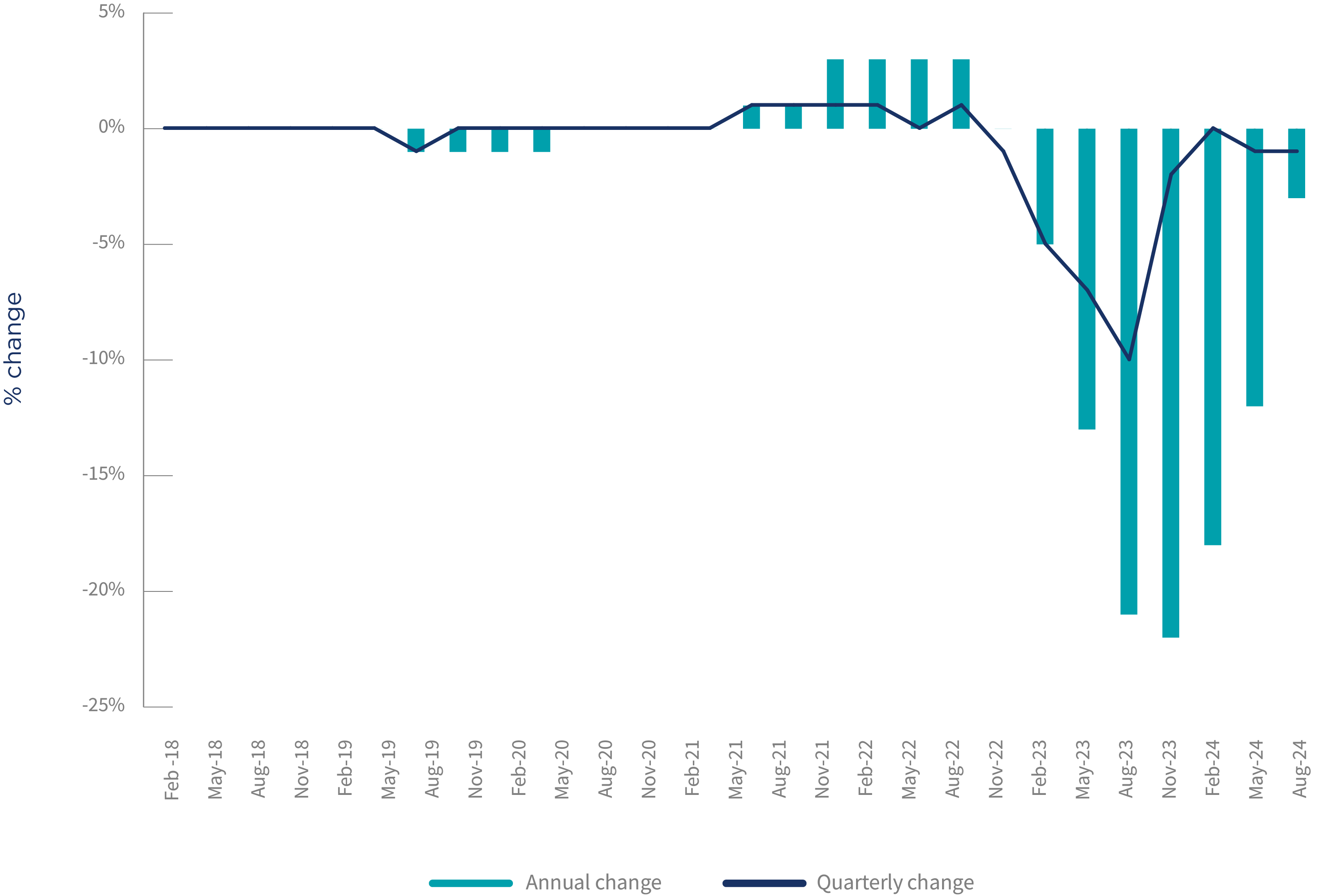
Note: The ASBFEO Small Business Pulse did not reflect a fall in 2020 as government support measures outweighed other economic impacts. As economic activity, including insolvencies, have returned to trend levels, the Pulse has reflected these shifts.
Source: ASBFEO, 2024.
- Explore the potential benefits of a tax discount/offset scheme for new small business owners to allow them to keep more of their income to re-invest in their business during the critical first three years.
- Focus on right-sized regulation, including how regulators and government formulate and administer laws, to help, support and enable small business owners, who do not have the resources of big business, meet their obligations.
- Require every Cabinet submission, preliminary and formal regulatory impact statement and new policy proposal to include a small business impact statement.
- Establish the Prime Minister’s Small Business Awards to recognise and celebrate excellence and inspire the next generation.
- Give small businesses an affordable, effective and timely alternative to defend their own economic interest where fair trading protections and reasonable commercial conduct safeguards are infringed upon, by creating a Federal Small Business and Codes List in the Federal Circuit and Family Court of Australia.
- Give small business a greater chance to compete for government contracts by decoding the rules and practices that favour the ‘in-crowd’ of familiar, established and larger suppliers.
- Make it mandatory for banks and other providers to charge the lowest fee for tap-and-go, dual-network debit card transactions as the default, saving small business around $1 billion a year.
- Undertake urgent and decisive action to ensure that essential insurances for small businesses are understandable, accessible and affordable.
- Ban unfair trading/business practices that distort competition and harm small business.
- Create a dedicated Small Business Commissioner and Division within the Fair Work Commission to honour the ‘special circumstances’ of smaller employers which existing workplace law is required to reflect and to oversee the implementation of proportionate instruments, procedures, practices and protections.
- Require digital platform providers to implement clear, appropriate and standardised procedures for timely small business dispute resolution.
- Honour businesses, big and small, who fulfil their workplace obligations to employees, meet tax reporting and payment obligations in a timely way and pay small business suppliers in under 21 days, with a ‘Good Business Pays’ recognition and accreditation.
- Expand digital learning and practical support via enterprise-specific capacity building and technology deployment and focusing on business system and reg-tech solutions, information management (including cyber resilience, eInvoicing, data management, privacy duties and Consumer Data Right awareness) and practical generative Artificial Intelligence uses.
- Develop a readily accessible and easily navigable central resource hub of ‘best of breed’ actionable information, supports, ‘how to’ guidance, programs and assistance developed by government and private sector specifically prepared for small and family business use.